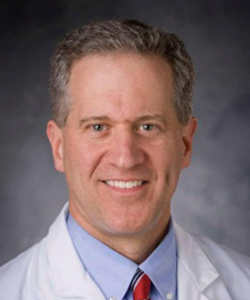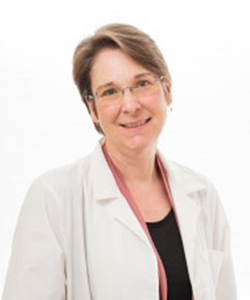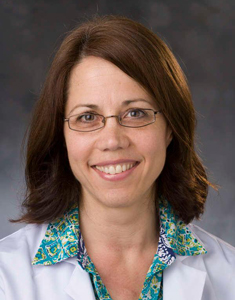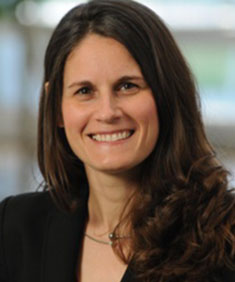
This spring, four faculty members in the Duke Department of Medicine have been awarded distinguished professorships. Distinguished professorships are awarded to faculty who have demonstrated extraordinary scholarship in advancing science and improving human health.
We asked our distinguished professors about their clinical, academic, and research interests and why they're passionate about this topic or area of focus, as well as to share what they feel are their most significant professional contributions to the field of medicine.
James B. Duke Distinguished Professor of Medicine

J. Andrew Alspaugh, MD
Professor of Medicine
Chief, Division of Infectious Diseases
"My clinical and research programs have focused on advancing care for highly immunocompromised patients with life-threatening opportunistic infections," said Dr. Alspaugh. "When I first began studying this area, most of these infections occurred in patients with late-stage HIV infection. Although tremendous advances have been made in subsequent years in our treatment of people living with HIV, we now see different populations of patients with compromised immune systems. These include those treated with novel therapies for cancers and autoimmune disorders."
"We have identified microbe-specific biological processes that provide new insights into new targets for antimicrobial therapy. I hope that the translational of these insights into clinical practice will lead to better treatments for very serious infections. I am also very proud of the outstanding scientists who trained with me who are now pursuing their own careers in ways that were not imaginable just a few years ago."
James B. Wyngaarden Distinguished Professor of Medicine

Cathleen Colón-Emeric, MD, MHS
Professor of Medicine
Chief, Division of Geriatrics & Palliative Care
"During my clinical training in geriatrics, I watched far too many active, vibrant older adults - including my own grandmother - experience significant disability, functional decline and even death following a hip or other major osteoporotic fracture," said Dr. Colón-Emeric. "My research program has focused on finding ways to prevent fall-related injuries such as fractures, and improve recovery once they have happened. Every 17 seconds an older adult presents to a U.S. emergency department after a fall, making this one of the most common preventable causes of disability."
"Early in my career I was privileged to be a part of an interprofessional research team that proved once-yearly intravenous bisphosphonates reduced secondary fracture rates, improved quality of life, and prevented deaths after hip fracture - even in the oldest and frailest individuals. Since that time, I have worked to design and implement care models that deliver evidence-based interventions preventing injurious falls and fractures, particularly in nursing home and post-acute care settings. More recently I have become interested in the mechanisms underlying resilience after a major health stressor such as fracture or orthopedic surgery, and identifying individuals who are at risk for poor outcomes so we can intervene to improve their recovery."
James Wyngaarden Distinguished Professor of Medicine

Stefanie Sarantopoulos, MD, PhD
Professor of Medicine
Chief, Hematologic Malignancies and Cellular Therapy
"Over the last two decades, I have focused on developing safer and more effective immunotherapies for blood cancer patients", said Dr. Sarantopoulos. "I became passionate about this area when I started caring for patients in the hospital and clinic who had been cured of their cancer with cellular immunotherapy in the form of allogeneic hematopoietic stem cell transplantation. It was exciting to see that immune cells given to patients eradicated tumor cells, but unacceptable that while we could cure patients of cancer, we often gave patients another life-altering condition called chronic graft versus host disease (GVHD). When I entered this field, little was known about how to therapeutically target chronic GVHD without affecting anti-tumor immunity, and I thought that my background and interest in B cells might eventually lead to clinical agents that might help cancer patients."
"Armed with both a passion for chronic GVHD patients and B cell biology, I’ve led a research team that has brought what we learned in the laboratory about human B cell pathobiology into the clinic. The privilege of my life is continuing to mentor future generations who will improve human health through their science."
Catherine Wilfert Distinguished Professor of Medicine

Susanna Naggie, MD
Professor of Medicine
Infectious Diseases
"As a clinical investigator, my research interest has always aligned with my clinical interest and expertise," said Dr. Naggie. "As a medical student in Baltimore from 1998-2002 the HIV epidemic was far from where we are today. Rounding on general medicine, the majority of patients I cared for had complications of HIV. I fell in love with the patients and the disease. I did my sub-internship on the Osler 8 HIV Ward and my desire to care for people with HIV and to try to improve their care and their health was set. At Duke I found that there was a group of patients with HIV that were falling through the cracks due to their co-morbidity with chronic HCV infection and decided that this was an opportunity to improve the care of this population. I was very lucky to be at Duke where the world’s largest academic research organization, the Duke Clinical Research Institute (DCRI), is housed. As a junior faculty I had the opportunity, thanks to amazing mentorship at DCRI, to lead national clinical trials that would ultimately lead to the approval of novel HCV direct acting antivirals for people with and without HIV. Most importantly, I had the opportunity to advocate to industry sponsors the importance of doing the studies to get the FDA approvals for people with HIV and not excluding them from the registration trials, which was very common at that time."
"I would probably say my contribution has been two fold. First, as noted above, I was lucky to have the ability to play a national role in advocating for and leading national trials that would result in the FDA approval of HCV direct acting antivirals for people with HIV. From there I have been able to lead trials, through the AIDS Clinical Trials Group, in people with HIV and acute (not chronic) hepatitis C infection, to shorten therapy while optimizing treatment response. Along the way this has given me the opportunity to serve on multiple national guideline panels and advocate for the importance of treating HCV in people with HIV and the impact of untreated liver disease on the morbidity and mortality for this population. I am now doing very similar work with a focus on people with HIV and HBV infection. What is likely my second most significant contribution is related to the COVID clinical trials that we have been able to lead through the DCRI. Like many faculty in infectious diseases, the COVID-19 pandemic required a pivot, given the need to rapidly and efficiently develop data on treatment and management interventions that would impact the high mortality reported in the early days of the pandemic. DCRI and Duke were leaders in this space, and with colleagues at DCRI we led what is probably the largest decentralized randomized controlled trial ever conducted, to test repurposed drugs for the treatment of mild to moderate COVID-19. This trial has informed national and international guidelines on the treatment and management of COVID-19."